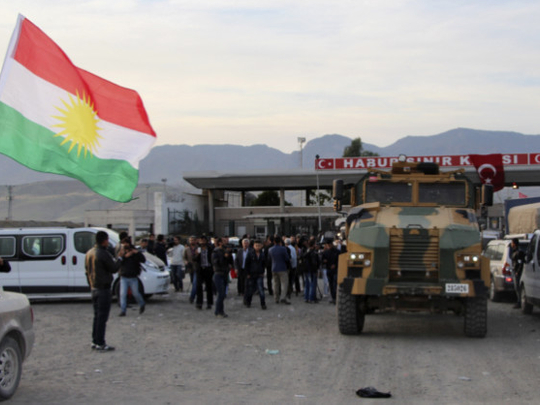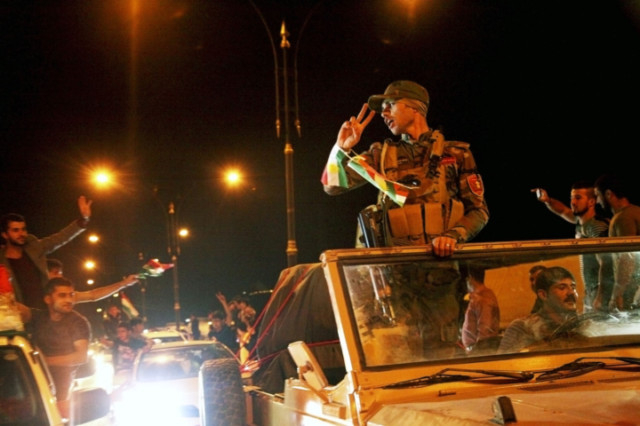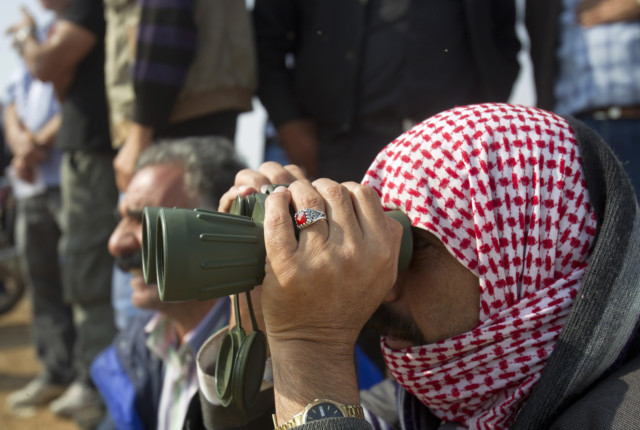
Sanliufra, Turkey: Iraqi Peshmerga fighters arrived in southeastern Turkey early on Wednesday ahead of their planned deployment to the Syrian town of Kobani to help fellow Kurds repel a Daesh advance which has defied US-led air strikes.
A Turkish Airlines plane touched down in the southeastern city of Sanliurfa at around 1.15am amid tight security. A convoy of white buses escorted by armoured jeeps and police cars left the airport shortly afterwards.
Kobani, nestled on the border with Turkey, has been besieged by Daesh militants for more than a month and its fate has become an important test of the US-led coalition’s ability to combat the insurgents.
“They will be in our town today,” Adham Basho, a member of the Syrian Kurdish National Council from Kobani, said of the Peshmerga, confirming that a group of between 90 and 100 fighters had arrived in Sanliurfa overnight.
Daesh has caused international alarm by capturing large expanses of Iraq and Syria, declaring an Islamic “caliphate” erasing borders between the two and slaughtering or driving away communities who do not share their ultra-radical brand of Islam.
Weeks of US-led air strikes on the insurgents’ positions around Kobani and the deaths of hundreds of their fighters have failed to break the siege on the town.
Daesh has threatened to massacre Kobani’s defenders in an assault which has sent almost 200,000 Syrian Kurds fleeing to Turkey, and triggered a call to arms from Kurds across the region.
The Iraqi Kurdish region’s parliament voted last week to deploy some Peshmerga to Syria and, under pressure from Western allies, Turkey agreed to let Peshmerga forces from Iraq traverse its territory to reach Kobani, which is also known as Ain Al Arab.
‘Partner on the ground’
Saleh Muslim, co-chair of the Syrian Kurdish Democratic Union Party (PYD), said late on Tuesday that about 150 Peshmerga were expected to reach the area of Kobani overnight.
A separate group of Peshmerga fighters is thought to be travelling to the Turkish border region by land. A Kurdish television channel showed footage of what it said was a convoy of Peshmerga vehicles loaded with weapons en route to the area.
“We’ve advocated and been discussing the importance of allowing the Peshmerga across the border and the facilitation of that,” US State Department spokeswoman Jen Psaki told a daily briefing in Washington on Tuesday.
“This is one component. It’s certainly one that we felt would be impactful and be important to have a partner on the ground to work with,” she said, adding she was unable to immediately confirm reports that the deployment had begun.
Kurdistan’s Minister of Peshmerga, Mustafa Sayyid Qader, told local media on Tuesday that no limits had been set to how long the forces would remain in Kobani. The Kurdistan Regional Government in Iraq has said the fighters would not engage in direct combat in Kobani but rather provide artillery support.
Turkish officials have rebuffed international criticism over their reluctance to do more to help Kobani’s beleaguered Kurdish defenders, whom they accuse of being linked to the militant Kurdistan Workers’ Party (PKK), which has fought a decades-long insurgency against the Turkish state.
That stance has enraged Turkey’s own Kurdish minority — about a fifth of the population and half of all Kurds across the region. Kurds suspect Ankara would rather see Daesh militants extend their territorial gains than allow Kurdish insurgents to consolidate local power.
Police shot into the air and fired tear gas to disperse hundreds of Kurdish supporters gathered at the Habur border gate overnight to welcome the arrival of the Peshmerga after they began throwing stones into a police compound.
Turkish Prime Minister Ahmet Davutoglu said on Tuesday that air strikes alone would not be enough to push back the insurgents and that only the Peshmerga and moderate Syrian rebel forces could oust Daesh from Kobani.














